Recent Homebuyers Endured Tough Competition, High Home Prices and Rising Mortgage Rates, Leading 65% to Lose Sleep During the Homebuying Process
It’s not news that the past two years have been tough on homebuyers. But fierce competition, skyrocketing prices and roller-coaster mortgage interest rates have had effects beyond the realm of finance. According to the newest LendingTree survey, nearly two-thirds of recent homebuyers who’ve purchased in the past two years say they’ve lost sleep during the home shopping process, and more than 4 in 10 have cited homebuying as a source of family arguments.
“Buying a house is often stressful, even in the most buyer-friendly markets,” says Jacob Channel, LendingTree senior economist, “and it can be even more challenging in a market as expensive and generally unfriendly as today’s is.”
The expectable stress of moving has been made all the worse by the recent market’s demands, prompting buyers to place multiple offers over the asking price in hopes of securing their dream home … or any home that’s available.
Key findings
- The past two years have been a seller’s dream but a homebuyer’s nightmare. 65% of recent homebuyers say they lost sleep during the process, while 42% say house hunting caused arguments in their family. To compare, 34% of homeowners who purchased their home at least five years ago lost shut-eye during the process, while only 12% had related arguments with family.
- Fierce market competition and offers above the listing price could have contributed to these restless nights. Those who purchased their homes in the past 24 months were almost three times as likely to pay over the asking price than those who bought at least five years ago — 26% versus 9%, respectively.
- An offer above the listing price doesn’t always close a deal, and the majority of recent buyers had to submit multiple offers before closing on a home. Only 61% of recent homebuyers were able to close on their first home choice, compared with 73% of those who purchased their home more than five years ago. In addition, recent buyers are more than twice as likely to have submitted multiple offers than those who purchased more than five years ago — 56% versus 26%, respectively.
- A fast-paced market amid a pandemic meant fewer buyers than in years prior were able to tour their homes before putting in an offer. More than half of buyers (55%) in the past two years made an offer without touring the home, a significant difference from the 18% of buyers who did so when they purchased their home more than five years ago.
- Not only did home prices surge, but so did mortgage rates. As the Federal Reserve continued to raise its key interest rate to try to curb inflation, recent homebuyers faced rising mortgage rates. There could be a refinance boom once rates begin to drop, as 62% who purchased in the past two years hope to refinance.
Homebuying is leading to sleepless nights, arguments
As hard as it is to find your dream home, it’s even harder when you can’t sleep. Among homebuyers who purchased in the past two years, 65% say they’ve spent restless nights in the process. To make matters worse, 42% say they’ve had family arguments about homebuying, too.
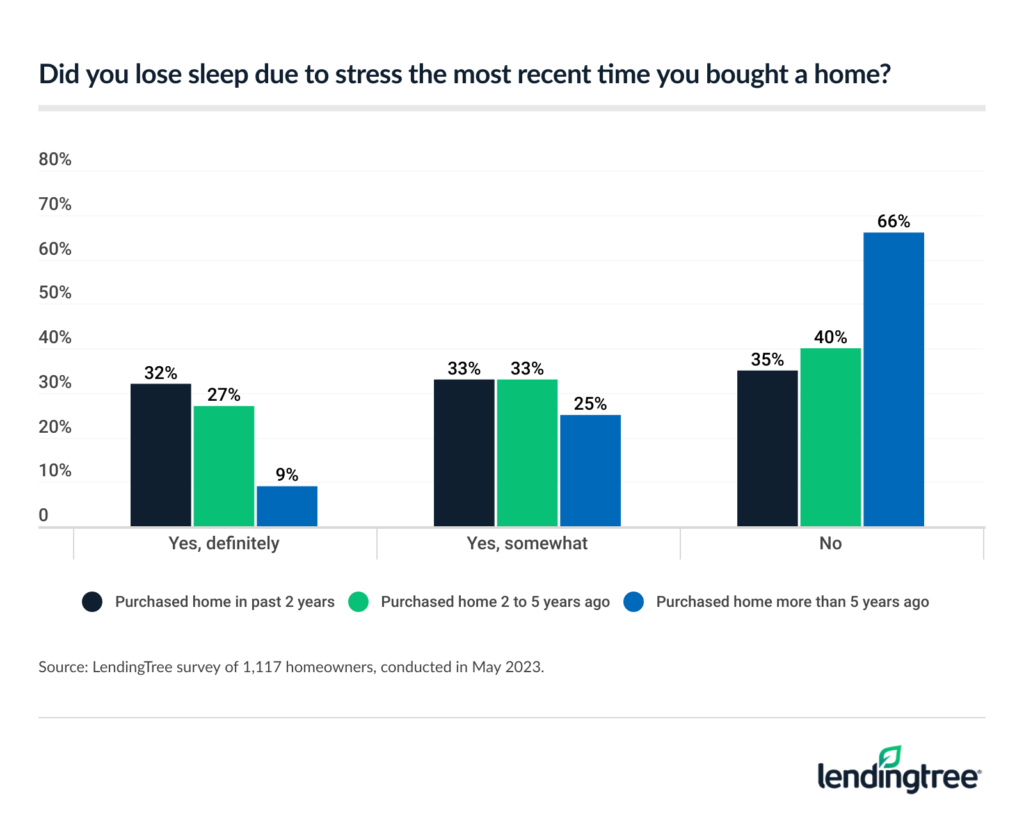
That’s more than the 34% of buyers who say they lost sleep while shopping for the home they purchased over five years ago — a time when only 12% say they had it out with a family member about the homebuying journey.
One possible cause for this shift? The competitive market means more buyers than before are paying over the asking price: 26% of respondents who bought in the past two years say they did so, while only 9% of those who bought more than five years ago did.
And sacrificing savings to ensure you’re the highest bidder isn’t always the smartest possible financial move. However, says Channel, “in some instances, offering more than asking price might be necessary to win a bidding war on a home” — something today’s buyers have learned.
Still, he cautions that “you should only offer more money if you can truly afford it.” If that extra incentive for the seller means you’ll be left without an emergency fund, you’ll be “financially vulnerable,” Channel says … not to mention increasing the overall amount of debt you’ll need to repay as part of your mortgage.
Fewer homebuyers missing out on their first choice
One piece of positive — and somewhat surprising — news: Despite the trials and tribulations of the market, most homebuyers are still getting their first choice … though this metric, too, has shrunk in recent years.
More than 6 in 10 (61%) recent buyers say the home they ended up in was their first choice — though that figure jumps to 73% among those who bought more than five years ago.
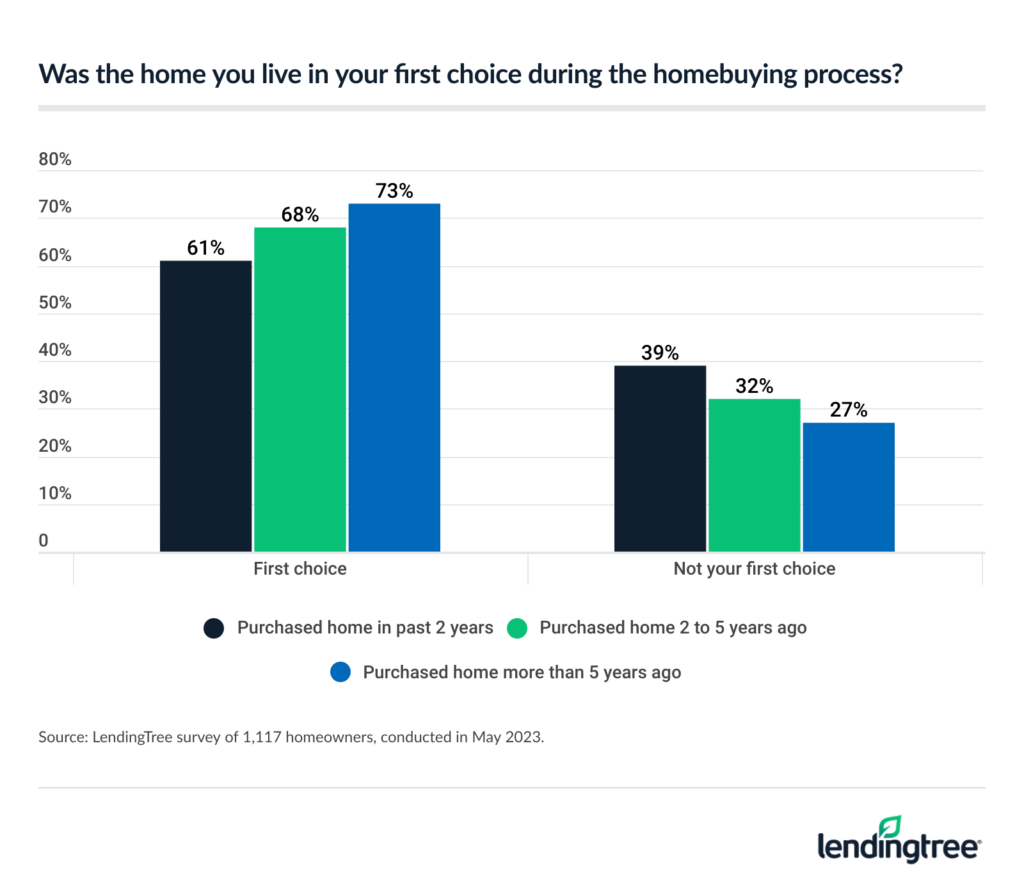
Still, the homebuying process isn’t always an easy one. More than half of recent homebuyers — 56% — made offers on multiple properties, with a whopping 9% making offers on five or more. Compare that dynamic to the market five-plus years ago, when almost three-quarters (74%) of buyers made a single, successful offer.
When it comes to a decision as big as your future home, it’s worth shopping around for that perfect Goldilocks fit. Still, as Channel warns,t “you should focus on making an offer on one property at a time” — placing multiple offers at once can be a recipe for financial disaster.
But, yes, it’s worth having a Plan B (and possibly a Plan C) in place. Channel suggests finding approximately three homes you really like and could envision a life in — “that way, you’ve got some alternative options to fall back on should your first choice slip from your grasp.”
More homebuyers are making offers without tours
Home shopping was already stressful enough when considering a house meant walking through it. But as pandemic fears lessen, many buyers are purchasing homes sight unseen: 44% of those who bought their home in the past two years never physically toured it beforehand, significantly higher than the 14% of buyers who did so when they purchased over five years ago.
Given the market, this tendency likely has less to do with a freewheeling attitude toward homebuying and more to do with an extremely limited, expensive and fast-moving inventory. A full quarter of recent buyers started looking a whole year before they expected to make their purchase. (Compare that to five years ago, when 10% of buyers started looking the same month they bought.)
Today’s buyers are also more likely to overlook price — or at least balance it with other factors — than past buyers were when choosing a home. When asked to name the three most important factors in their homebuying decision, 80% of those who bought over five years ago indicated price, while only 66% of recent buyers did. Recent buyers were also more concerned than past buyers about the size of their homes, with 68% of them naming it as a top factor — making it the most important consideration for this group. (With more people working remotely, home office space is more important than ever, which may account for this shift in priorities.)
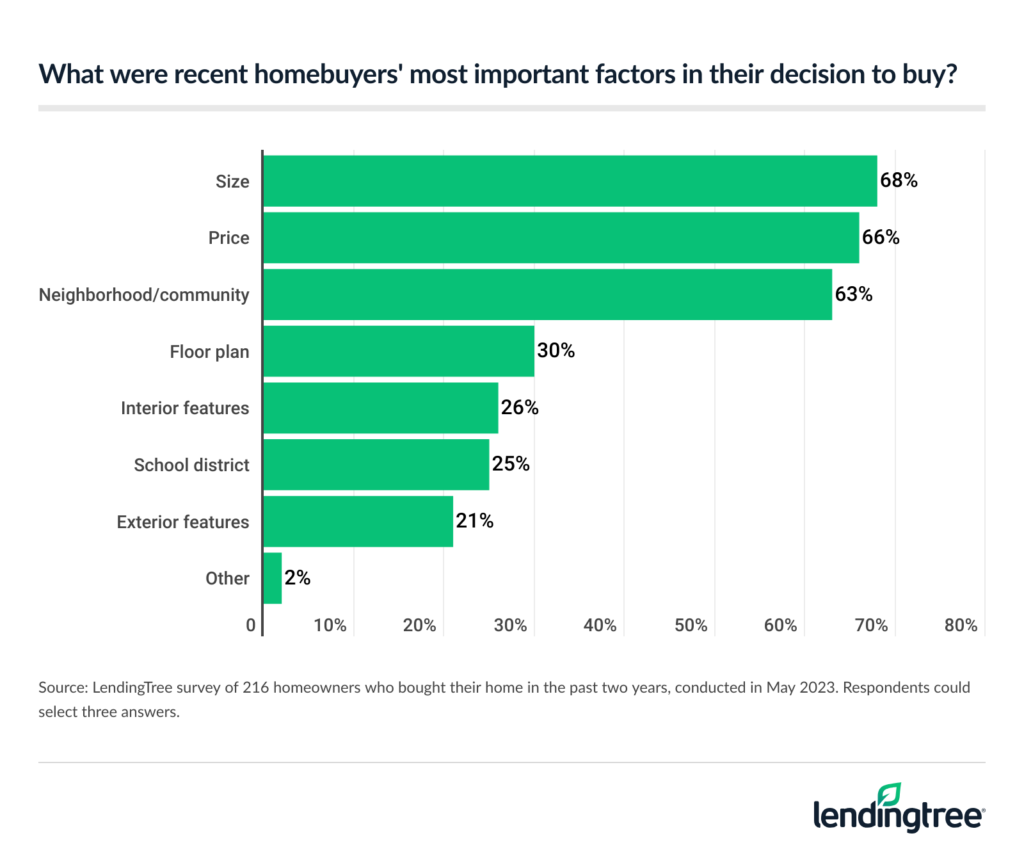
Regardless of which factors you consider most important as a homebuyer, “if you can, you should always try to tour a house before you make an offer on it,” says Channel. “Pictures don’t always tell the whole story.”
“If you do want to make an offer sight-unseen, be sure that it’s been professionally inspected,” he goes on to say — an important tip for first-time homebuyers in any instance. “That way, you’ll at least know if there’s anything structurally wrong with the home before you buy it.”
Homeowners are thinking about their next home
Market turbulence notwithstanding, plenty of people are still ideating about their next home: 34% of homeowners say they plan to move sometime in the next five years, while less than a quarter (24%) report they’re in their forever home.
Why go through the trouble of moving — and dealing with the market — yet again? Homeowners who aren’t in their forever homes have plenty of different (and sometimes divergent) reasons, with nearly as many hoping to downsize (35%) as they are to upsize (37%). Most of these respondents say the price will be one of the most important factors in their next home purchase (73%), but neighborhood and size are important, too, with 62% and 58% citing so, respectively.
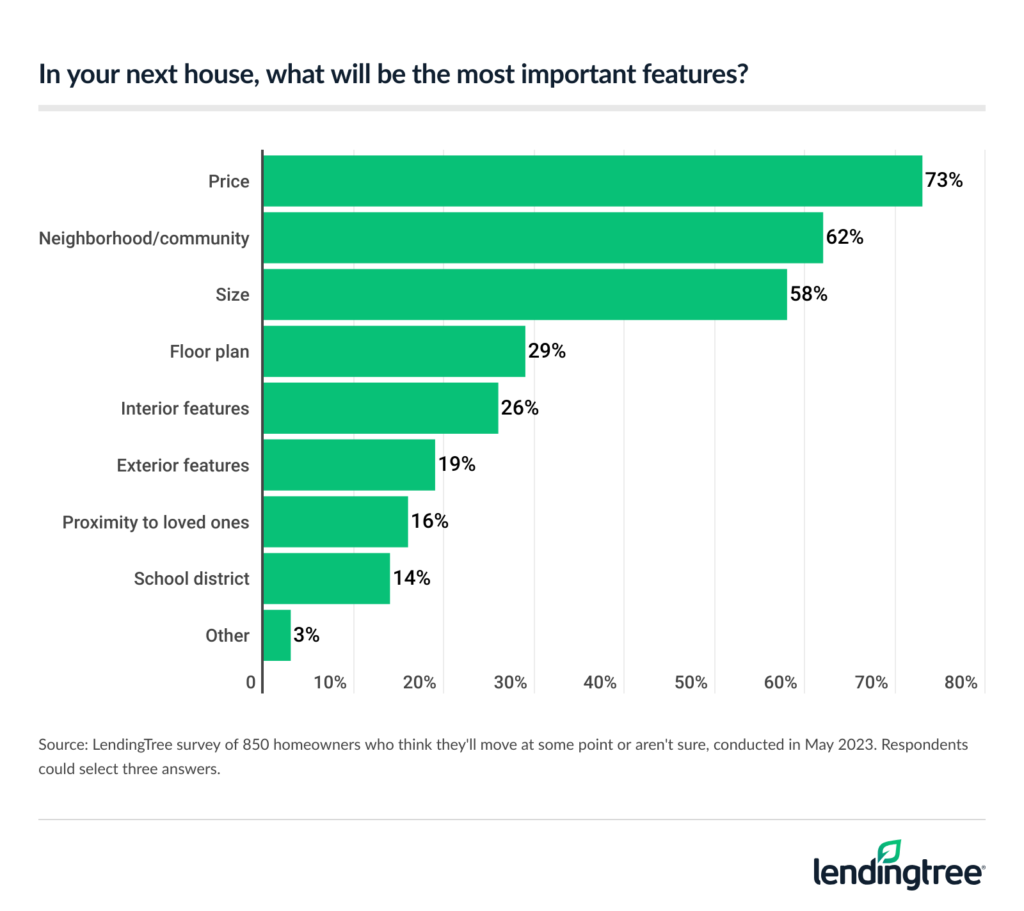
“The truth is that it’s hard to find a house that’ll suit your needs at every stage in your life,” Channel says. For some, moving to a new area might be worth the cost and hassle, for instance — though millennial and Gen Z homebuyers might disagree about which metros are worth it.
Still, financially speaking, it’s essential to take the time to carefully plan out your move, particularly if you bought recently. “It can take years before you start getting money out of a house,” Channel says, “and selling too soon can be a costly mistake.”
That’s to say nothing of today’s high interest rates — which may be why 52% of respondents who aren’t in their forever homes say they’re waiting for mortgage rates to drop before buying their next one.
Do you plan to refinance your mortgage if rates drop below your current rate?
Refinancing can be a great way to save money on interest in the long term, or even to lower your monthly payment. And 62% of homeowners who purchased in the past two years say they plan to refinance as soon as rates fall below their current rate. According to Channel, there’s no need to rush.
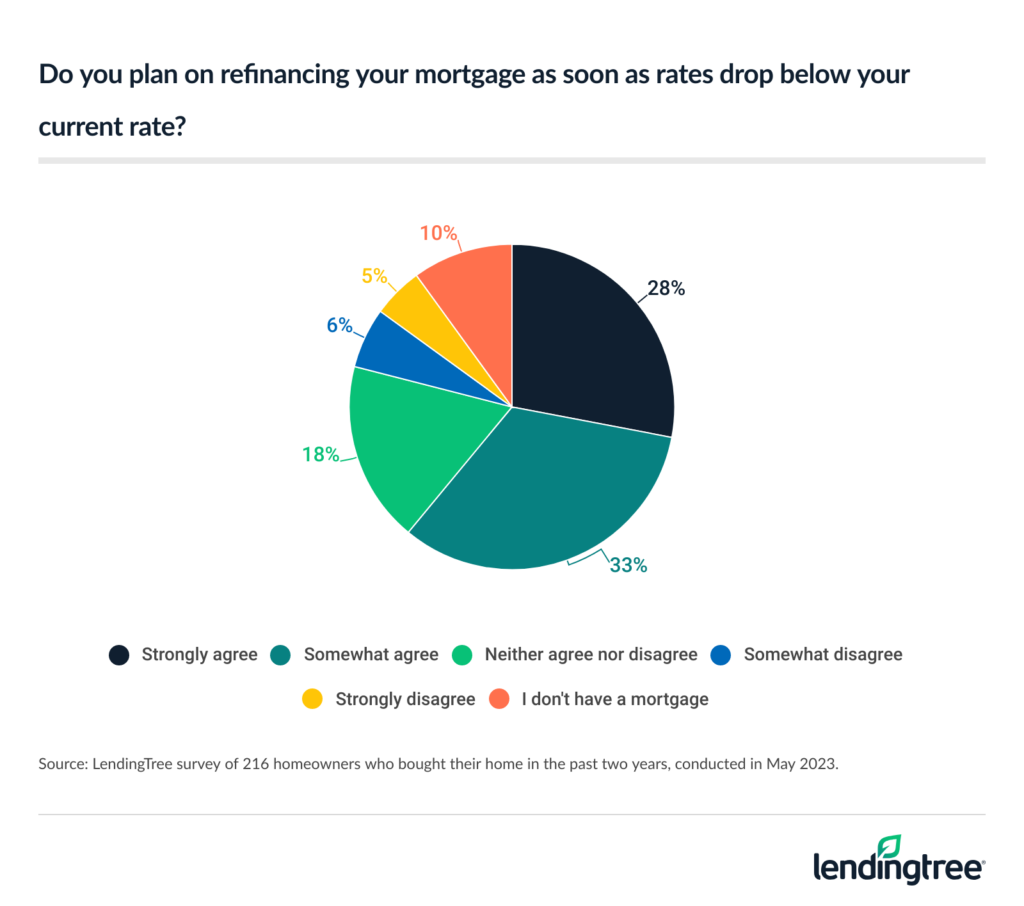
“While rates may come down over the next year or so, they’re unlikely to fall back to their 2020 and 2021 levels,” Channel says. “Because so many people either bought a new home or refinanced during the height of the pandemic, there aren’t going to be a lot of opportunities for most people to refinance in the near future.”
In addition, refinancing comes at its own cost — which is why you should only consider it if current rates are at least one full percentage point lower than what you’re paying.
And given this helter-skelter market, Channel says, “nobody should expect refinancing to suddenly become a must-do for most current homeowners anytime soon.”
The good news? Not having to worry about refinancing might allow some homeowners to catch up on all that lost sleep.
Methodology
LendingTree commissioned Qualtrics to conduct an online survey of 1,967 consumers from May 16-18, 2023. The survey was administered using a nonprobability-based sample, and quotas were used to ensure the sample base represented the overall population. Researchers reviewed all responses for quality control.
View mortgage loan offers from up to 5 lenders in minutes

